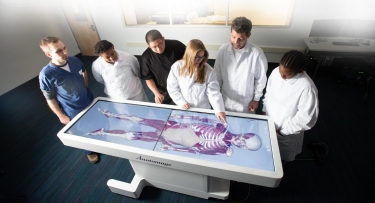Thanks to a $3 Million Federal Title V Grant Mercy College is Actively Pursuing Initiatives to Support Student Success in the Health Sciences

After receiving an almost $3 million grant from the U.S. Department of Education under the Title V Developing Hispanic Serving Institutions program in 2020, Mercy College is now in the process of implementing several initiatives to expand opportunities and improve outcomes for students studying the health sciences — with a special focus on supporting Hispanic students. While each initiative is administered over the course of five years, the early data is promising.
The Advancing Curricular Change to Enhance Student Success (ACCESS) initiative has two primary goals: improve student outcomes in Anatomy & Physiology I (A&P I) — a gateway course for health sciences majors — and fill the region’s pressing need for more nurses by establishing a weekend Accelerated Second Degree Nursing (ASDBS) program.
To meet the first goal, Mercy is implementing several new support services in A&P I, including expanding the Learning Fellows program, redesigning the A&P I lab curriculum and implementing an exam wrapper program. This part of the ACCESS project is led by activity co-directors Irina Ellison, Ph.D., associate professor and interim associate dean of the School of Health and Natural Sciences; assistant professor Ferdinand Esser, D.C.; and clinical assistant professor Jean Walsh, D.C.
The Learning Fellows program has existed for several years, but the ACCESS grant — in partnership with Mercy’s Center for Academic Excellence and Innovation (CAEI) — is supporting the addition of more training and a greater focus on gathering data on outcomes. Learning Fellows are students who did well in a course in a previous semester and apply to serve as peer mentors for students currently taking the course. They meet weekly with small groups of students to help explain the content, model study skills and build community. “I can understand some of the struggles they're going through,” said Luis Aguilar ’25, a Learning Fellow who is majoring in nursing. “It feels nice being able to reassure students that no matter how hard it may seem, eventually you all get used to it and you will succeed and thrive.”
Another initiative aimed at increasing student success in A&P I is the recent redesign of the A&P I lab curriculum to be more focused on inquiry and problem-solving. This redesign effort in 2017 was supported by the generous donation of an Anatomage Table by Gioietta and Alberto Vitale, H.D. ’09. This table — which displays life-size bodily anatomy on what resembles an operating table — enables students to use touch-screen technology to visualize, manipulate and dissect the human body virtually. Once the faculty experienced this cutting-edge technology, they saw all kinds of instructional possibilities, but they needed more Anatomage Tables before they could truly integrate the technology into the curriculum. The ACCESS grant is funding the purchase of four more tables to bring the redesigned curriculum to life.
In partnership with CAEI, the ACCESS project team also developed and piloted an “exam wrapper” program. If a student scores poorly on an exam, they can use the exam wrapper — a metacognitive tool — to reflect on their exam results and identify why they did not perform well, meet with a coach to plan for improvement and then request to retake the exam. Initial data suggests that students who took advantage of this program increased their exam scores an average of seven points upon retesting.
Though many of these A&P I support services are still in the initial stages, there are encouraging results already. “We've seen a significant increase in student success,” said Joan Toglia, former dean of the School of Health and Natural Sciences. “A couple of years ago, 40% to 46% of students were earning grades below C in the Anatomy & Physiology lab. In the fall semester, that was down to 16%. That's a dramatic change!”
The ACCESS project’s second goal — filling the region’s pressing need for more nurses by establishing a weekend Accelerated Second Degree Nursing (ASDBS) program — is also in process with the launch of the ASDBS program in September 2021. Designed for students who already hold a bachelor’s degree in a non-nursing field of study, this program requires students to attend 18 months of classes on Fridays, Saturdays and Sundays. “This program allows a more diverse group of people to train for careers in nursing,” said assistant professor Shevonba Graham, RN — an activity co-director for this part of the ACCESS project along with Professor Deborah Hunt, Ph.D. “Now, someone who works and has a family can pursue their dream of becoming a nurse on the weekends.”
The program involves a mentorship component, which was developed in partnership with New York chapter of the National Association of Hispanic Nurses (NAHN). Nurse mentors meet with Mercy’s ASDBS students at least once per month to share their experiences and guidance. Students find that connecting with nurses currently working in the field, who represent similar cultural backgrounds, provides them with meaningful motivation and support.
Ultimately, once the five-year ACCESS project is complete in 2025, Mercy leaders and faculty will have developed a set of proven practices that enhance student success in terms of, persistence in their majors and programs, graduation rates, growth mindset and sense of belonging. The goal is to share and implement these widely across Mercy College to impact the success of many more Mercy students.
“We’re in the second year of a five-year grant, so we still have time to learn and refine what we're doing,” said Toglia. “But as we create and describe best practices that impact student success, we’re really hoping that those can extend to other courses and programs and that they become institutionalized.”
Click on the below links to learn more about the Mercy College Learning Fellows program and what motivates Mercy students to become Learning Fellows:
